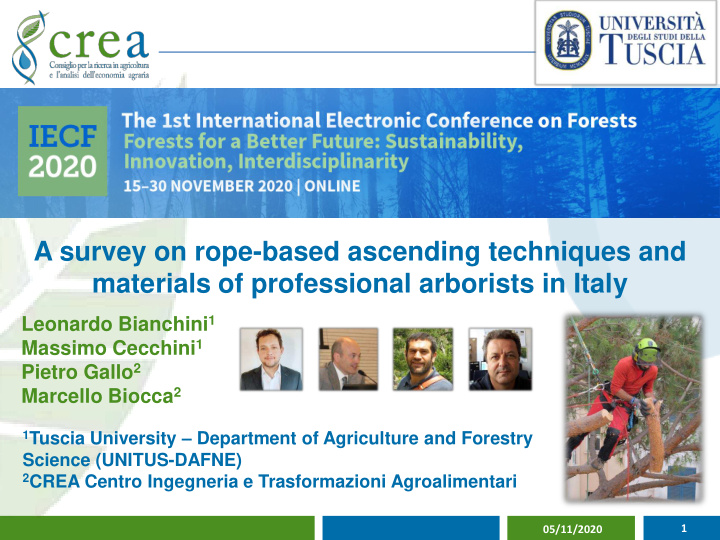



A survey on rope-based ascending techniques and materials of professional arborists in Italy Leonardo Bianchini 1 Massimo Cecchini 1 Pietro Gallo 2 Marcello Biocca 2 1 Tuscia University – Department of Agriculture and Forestry Science (UNITUS-DAFNE) 2 CREA Centro Ingegneria e Trasformazioni Agroalimentari 1 05/11/2020
Introduction Urban forestry and green areas are increasingly important but require workforce and professionality to manage trees. Tree-climbing (rope-based access methods): ▪ pruning, ▪ felling of trees, ▪ cabling, ▪ phytosanitary inspections, ▪ others. Advantages: ▪ targeted and selective interventions on tree branches, ▪ reaching internal portions of the canopy, ▪ accessing to trees located in confined areas where machinery cannot enter. The scientific literature about the technical and economic evaluation of maintenance operation performed by tree-climbing appears rather poor. 2 05/11/2020
Methods Questionnaire objective contents Close-ended structure subjective content five-point Likert scale Questionnaire sections safety personal data formation work organization opinions 48 questions 86 operators In this paper we analyze technical information related to 26 answers 3 05/11/2020
Results The participants Geographical work areas All males North Eastern 21% Age: 62.8% were less than 40 years North Western 31% Level of education: Central 40% 59% high school diploma, 17% Master degree or post graduate degree, i.e. PhD South and Islands 8% The degree of education significantly differs (p-value = 0.01242 Working positions Pearson’s Chi - ▪ were freelance (44%), ▪ company owners (34%), squared test) ▪ employee (17%), according to area of ▪ contractor (2%) work ▪ member of cooperative (2%). 4 05/11/2020
Results Professional training Compulsory course: specific module on rope work on trees Art.116 - annex XXI D.Lgs. 81/08. 8 out of 86 (9.3%) did not attend the course The other courses Other qualification courses ▪ basic ▪ other courses related to the profession courses for Health & safety Manager (Directive 89/391/EEC) (40.7%), ▪ voluntary (68.6%), certification courses ▪ mobile aerial platforms (64%), (European Tree Worker - ETW) (32.6%). ▪ chainsaw (59.3%), ▪ first rescue (51.2%) ▪ anti-fire (39.5%), ▪ supervisor (36.0%), ▪ gardener (14.0%). 5 05/11/2020
Results Techniques Single Rope Technique (SRT) 70% Doubled Rope Technique (DdRT)17% DdRT with handled rope clamp and Climbing spike and adjustable prusik 8% lanyard 5% 6 05/11/2020
Results Mechanical descenders or friction hitches Mechanical descender Zig zag 71.8% Rig 30.8% Friction hitches Valdotain tresse 58.3% Blake’s hitch 45.8% 7 05/11/2020
Conclusions ▪ The sector is characterized by a high level of operator education, training and a high degree of technological innovation both in terms of techniques and tools and equipment. ▪ We have compared the results with a previous survey carried out by Mazzocchi in 2017. ❑ A reduction of self-employed workers was observed (44% versus 63%). ❑ An increase in employers and employees (respectively 34% and 17% against 20% and 5%). ❑ An increase in the use of mechanical descenders (ZigZag 71.8%) which in the past was around 31%. ❑ A change was observed is the increase in the number of operators having got voluntary ETW certification, which increase from 27% to 32.6%, ❑ An increase in the use SRT techniques is clearly preferred (70% versus 50%). 8 05/11/2020
Conclusions In the present study, technical and work conditions of professional arborists operating in tree care and maintenance were indagated by means of a survey carried out at national level. The role of the professional arborist has gone beyond being only a pruner, as training and continuing specialization allow operators to provide tree management services from many domains. However, further in-depth studies are desirable to improve productivity and safety of this type of emerging work dedicated to the correct management of urban green areas. 9 05/11/2020
Acknowledgements The authors are grateful to the professional arborists of the following companies who have contributed to the development of the questionnaire Ecologistica Srl (Viterbo) UTM Soc. Coop. (Oriolo Romano, VT) Vitarborea (Palombara Sabina, RM) l.bianchini@unitus.it 10 05/11/2020
Recommend
More recommend